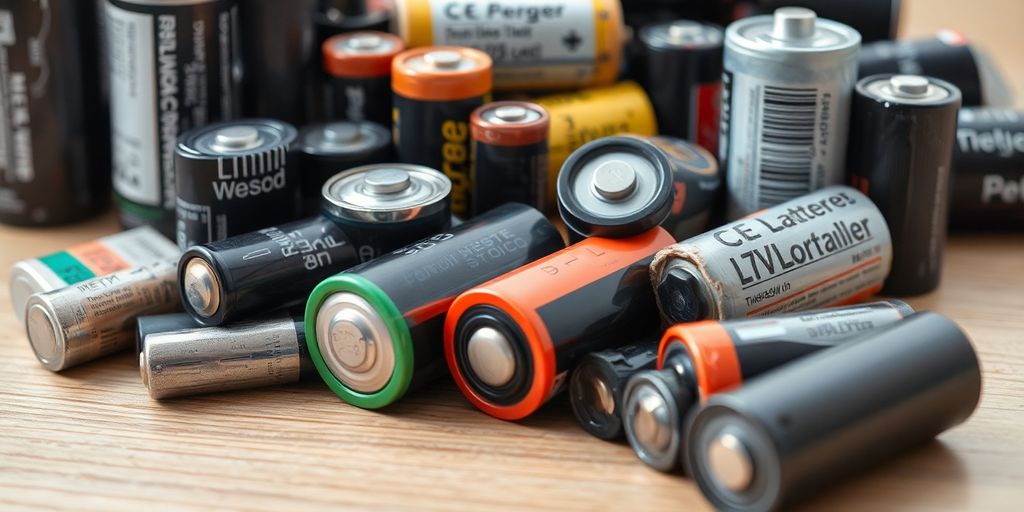Batteries play a vital role in our daily lives, powering everything from remote controls to cars. However, improper disposal can lead to serious environmental and health issues. This guide will help you understand the importance of recycling batteries, the different types of batteries, and how to find recycling options near you. By recycling batteries, you contribute to a healthier planet and help conserve valuable resources.
- Discover the Most Charming Cute Cafe Near Me: A Guide to Hidden Gems
- Discover the Best Park Garden Near Me: A Guide to Local Green Spaces
- Discover the Perfect Restaurant Cum Bar Near Me for a Memorable Night Out
- Discover Where to Buy Vegetable Plants Near Me for Your Garden Needs
- Discover the Best Couples Cafe Near Me for a Romantic Getaway
Key Takeaways
- Recycling batteries prevents toxic chemicals from harming the environment.
- Different types of batteries require specific recycling methods.
- You can find local recycling centers using online tools or community programs.
- Properly preparing batteries for recycling ensures safety and efficiency.
- Choosing local recycling services supports your community and reduces transportation emissions.
Understanding the Importance of Battery Recycling
Batteries are everywhere in our daily lives, from remote controls to electric vehicles. Recycling batteries is essential for protecting our environment and health. Here’s why it matters:
Environmental Impact of Improper Disposal
- Batteries contain toxic materials that can leak into the soil and water.
- When thrown away, they can harm wildlife and ecosystems.
- Recycling helps keep these harmful substances out of landfills.
Health Risks Associated with Battery Waste
- Improperly disposed batteries can release dangerous chemicals.
- These chemicals can contaminate drinking water sources.
- Communities near landfills may face health risks from exposure to these toxins.
Economic Benefits of Recycling Batteries
- Recycling batteries recovers valuable materials like lithium and nickel.
- This reduces the need for mining, which can be costly and harmful to the environment.
- Recycling creates jobs in the recycling and manufacturing sectors.
Recycling batteries not only conserves resources but also protects our planet for future generations.
By understanding the importance of battery recycling, we can all contribute to a healthier environment and a sustainable future.
Types of Batteries and Their Recycling Processes
Understanding the different types of batteries is essential for effective recycling. Each type has its own recycling process that helps recover valuable materials and protect the environment.
Single-Use Batteries
Single-use batteries are commonly found in household items like remote controls and toys. They are made of materials that can be recycled, including:
- Steel: Highly recyclable and often reused in new products.
- Manganese Dioxide: Can be processed for other uses.
- Zinc: Recovered and reused in various applications.
Rechargeable Batteries
Rechargeable batteries, such as lithium-ion and nickel-cadmium, are used in devices like smartphones and power tools. The recycling process involves:
- Collection: Batteries are gathered from drop-off points.
- Sorting: They are sorted by type to ensure proper recycling methods are applied.
- Material Recovery: Valuable metals like lithium and nickel are extracted for reuse.
Automotive Batteries
Read More : Discover the Top Night Out Places Near Me for an Unforgettable Evening
Automotive batteries are crucial for electric and hybrid vehicles. Their recycling process is more complex and includes:
- Safe Handling: Specialized equipment is used to manage hazardous materials.
- Material Recovery: Lead and other metals are extracted and reused.
- Safe Disposal: Any non-recyclable materials are disposed of according to regulations.
Recycling batteries not only conserves resources but also prevents harmful chemicals from polluting our environment. Every battery recycled makes a difference!
By understanding these types and their recycling processes, you can make informed decisions about how to dispose of your batteries responsibly.
| Battery Type | Common Uses | Key Materials Recovered |
|---|---|---|
| Single-Use Batteries | Remote controls, toys | Steel, Zinc, Manganese |
| Rechargeable Batteries | Smartphones, power tools | Lithium, Nickel |
| Automotive Batteries | Electric vehicles, backup systems | Lead, Cobalt |


How to Find Battery Recycling Centers Near You
Finding a battery recycling center nearby is easier than you might think. Here are some effective ways to locate these important facilities:
Using Online Recycling Locators
- Search Engines: Simply type "battery recycling near me" into your favorite search engine. This will provide a list of nearby options.
- Recycling Websites: Many websites specialize in recycling information. Enter your ZIP code to find local centers.
- Mobile Apps: Some apps are designed to help you find recycling locations based on your location.
Local Government and Community Programs
- City Websites: Check your local government’s website for information on recycling programs.
- Community Events: Many communities hold recycling events where you can drop off batteries.
- Household Hazardous Waste Facilities: These facilities often accept batteries along with other hazardous materials. For example, a facility in Martinez, CA, accepts batteries as part of their household hazardous waste program.
Retail Stores and Drop-Off Points
- Electronics Stores: Many electronics retailers have battery recycling programs.
- Grocery Stores: Some grocery chains offer battery drop-off bins.
- Auto Parts Stores: These stores often accept automotive batteries for recycling.
Remember, recycling batteries is not just about disposal; it’s about protecting our environment and conserving resources. Make sure to recycle responsibly!
Preparing Your Batteries for Recycling
Safe Storage Tips
To ensure safe recycling, store your batteries properly. Here are some tips:
- Keep batteries in a cool, dry place.
- Avoid stacking batteries on top of each other to prevent contact between terminals.
- Use tape to cover the terminals of batteries to prevent sparks.
Handling Leaking Batteries
If you find a battery that is leaking, handle it with care. Here’s what to do:
- Wear gloves to protect your hands.
- Place the leaking battery in a plastic bag.
- Contact your local recycling center for guidance on disposal.
Packaging for Transportation
When you’re ready to recycle, make sure to package your batteries correctly:
- Use a sturdy container to prevent damage.
- Keep batteries upright to avoid leaks.
- Label the container as containing batteries to inform handlers.
Proper preparation is key to ensuring that your batteries are recycled safely and effectively. Following these steps helps protect both you and the environment.
By taking these precautions, you can contribute to a safer recycling process and help reduce the environmental impact of battery waste.
Benefits of Choosing Local Battery Recycling Services
Choosing local battery recycling services comes with several advantages that can make a big difference for you and the environment.
Convenience and Accessibility
- Easier Transport: When you recycle locally, it’s much simpler to drop off your batteries. You won’t have to travel far, making it easier to get rid of them safely.
- Quick Access: Local services often have multiple drop-off points, so you can find one nearby without much hassle.
- Time-Saving: You can save time by not having to search far and wide for recycling options.
Supporting Local Economy
- Job Creation: By using local recycling services, you help create jobs in your community.
- Economic Growth: Your support helps local businesses thrive, which is good for everyone.
- Community Engagement: Local services often engage with the community, promoting awareness about recycling and sustainability.
Reducing Carbon Footprint
- Less Transportation Emissions: Recycling locally means less travel, which reduces carbon emissions from vehicles.
- Resource Conservation: By recycling, you help recover valuable materials like cobalt, nickel, and lithium, reducing the need for new mining operations. This is crucial for protecting our planet’s resources.
- Eco-Friendly Practices: Local companies often follow strict guidelines to ensure that recycling is done safely and responsibly.
Recycling batteries locally not only helps the environment but also strengthens your community. Every small action counts!
Trusted Battery Recycling Companies in the USA
When it comes to recycling batteries, choosing a reliable company is essential. Here are some trusted names in the industry:
Recycle Technologies
- Focus: Household battery recycling.
- Services: Convenient drop-off locations and mail-in recycling kits.
- Benefits: Promotes sustainability and environmental protection.
EZ on the Earth
- Focus: Electronic waste and battery recycling.
- Services: Comprehensive recycling processes for various battery types.
- Certifications: AAA, NAID, and EPA-certified.
Call2Recycle
- Focus: Community-based battery recycling.
- Services: Offers a network of drop-off locations across the USA.
- Impact: Helps reduce battery waste and promotes responsible disposal.
| Company Name | Focus Area | Certifications |
|---|---|---|
| Recycle Technologies | Household Batteries | None |
| EZ on the Earth | Electronic Waste | AAA, NAID, EPA |
| Call2Recycle | Community Recycling | None |
Choosing a reliable battery recycling company is crucial for protecting the environment and ensuring safe disposal.
Read More : Discover the Best South Indian Cafe Near Me for Authentic Flavors
By selecting one of these trusted companies, you can ensure that your batteries are recycled properly, helping to conserve resources and safeguard the environment.
Steps to Recycle Batteries at Home
Gathering and Sorting Batteries
- Collect all used batteries from around your home. Check places like remote controls, toys, and flashlights.
- Sort them into categories: single-use, rechargeable, and automotive batteries. This helps in knowing where to take them for recycling.
- Keep them in a safe, dry place until you are ready to recycle them.
Visiting Drop-Off Locations
- Find a nearby recycling center using online tools or local resources.
- Take your sorted batteries to the designated drop-off points. Many stores, like Lowe’s, have recycling programs.
- Ensure you follow any specific instructions provided by the recycling center.
Mail-In Recycling Options
- If you can’t visit a drop-off location, consider using a mail-in recycling service. Some companies offer kits that you can fill with batteries and send back.
- This option is convenient and allows you to recycle from home.
Recycling batteries is not just about disposal; it’s about protecting our environment and conserving resources. Every battery recycled helps reduce pollution.
By following these steps, you can easily recycle batteries and contribute to a healthier planet. Remember, responsibly recycling your batteries is a small act that makes a big difference!
Final Thoughts on Battery Recycling
In conclusion, recycling batteries is not just a good idea; it’s essential for protecting our planet. By finding a local recycling center, you can ensure that harmful materials don’t end up in landfills, which can damage our soil and water. Remember, every battery you recycle helps conserve valuable resources and keeps our environment safe. So, take the time to gather your used batteries and locate a recycling service nearby. Together, we can make a big difference in keeping our Earth clean and healthy.
Frequently Asked Questions
Why is it important to recycle batteries?
Recycling batteries helps keep harmful chemicals out of the environment. When batteries are thrown away, they can leak toxic materials that can harm soil and water. Recycling also allows us to reuse valuable materials.
What types of batteries can I recycle?
You can recycle many types of batteries, including single-use batteries (like AA or AAA), rechargeable batteries, and automotive batteries. Just make sure to check with local recycling centers for specific guidelines.
How do I prepare batteries for recycling?
Before recycling, store batteries safely in a container to prevent leaks. Make sure the terminals do not touch each other, as this can create sparks. If a battery is leaking, handle it with care and check if the recycling center will accept it.
Where can I find battery recycling centers near me?
You can find battery recycling centers by using online recycling locators or checking with your local government. Many retail stores also have drop-off points for battery recycling.
Is there a cost to recycle batteries?
Some places may charge a small fee to recycle certain types of batteries, while others offer free recycling services. It’s best to check with your local recycling center for their specific policies.
What happens to batteries after they are recycled?
After recycling, batteries are sorted and processed to recover valuable materials like lead, nickel, and lithium. These materials can be reused in new batteries or other products, reducing the need for new raw materials.
Soure: https://herego.net
Category: near me


